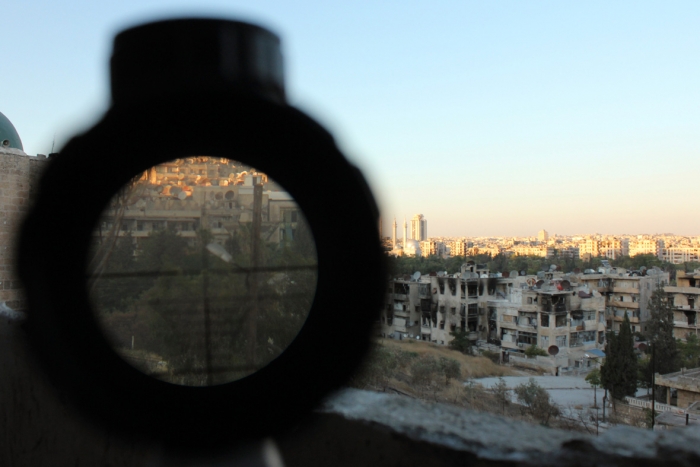They were sleeping when the sniper ascended this building, which had stopped being a garment workshop several years ago and had become the site of lovers’ occasional adventures… Everyone tried to recognize the face behind the heavily fortified barrier, but to no avail. The building was tall and there was great fear that his eye would meet theirs.
The men of the district congregated alongside houses far from his view, while women were occupied preparing food and bemoaning the sunflower and hibiscus season, without which it is always difficult, because they are under a curfew the likes of which they had never experienced before.
They sat on the pavement in front of Umm Mohamed’s house, the kindly old woman who loves gatherings. If he had been able to hear them talking, he would have learned a great deal about cinnamon and almonds and sweets and lamb testicles and everything having to do with pregnancy and menstruation and childbirth and the blue pills which Mariam’s husband, who had reached an old age, regularly ingests, and “the poor thing,” she married him a month after his first wife, her big sister, died, and she hadn’t gotten pregnant yet, although that’s nothing to be ashamed of, as Hajja Umm Taiseer always says — or the doctor’s mother, as the people of the district like to call her. And because they are women, they allow themselves to stay within the sniper’s sight, for who would be unreasonable enough to think they are suspicious, or that they are infiltrators attacking the country? As for those wicked children, they didn’t care about him and pointed at him thousands of times a day, warning one another that the building is no good for playing or messing around with birds’ nests.
The first day passed… The rarely-moving sniper became the talk of the hour. Despite his absence, he was present: Where does he get food? How does he stand this cold? Is he married? Does he have children? What does he look like? Where is he from? Is he Syrian?
It reached the point that Umm Mohamed decided to send one of the boys with a pot of tea to warm his stomach, although her daughter Yusra prevented her from doing it, to avoid trouble.
The second day passed… The sniper’s wait grew longer and his patience began to expire amid the bitter cold. Perhaps the scent of cooking emerging from the homes of the district annoyed him. He must have felt lonely there in his ivory tower, for all the people had neighbors, while he sat on the roof with no companion but the wind.
The third day began… Maybe the women of the district no longer resembled his mother, or maybe the children playing awoke a deep wound of his childhood, for he was probably the lazy child in his class, and thought that the teacher with short black hair and the beautiful mole on her white cheek didn’t like him, and maybe his father’s wife scolded him often, although he always got high grades in marksmanship and inspired the admiration of his instructors with his skill at striking his targets precisely.
His memory became empty except of memories of the shooting range, and the humming of bullets, and pictures of the eternal leader, and imperialism, and reaction, and the state of smallholders, workers and peasants, and the mantra “down and to the middle of the target” pulled the trigger of his patriotism. He moved his index finger, and the first of his targets … was the “terrorist,” Umm Mohamed.
This article was translated and edited by The Syrian Observer. Responsibility for the information and views set out in this article lies entirely with the author.


